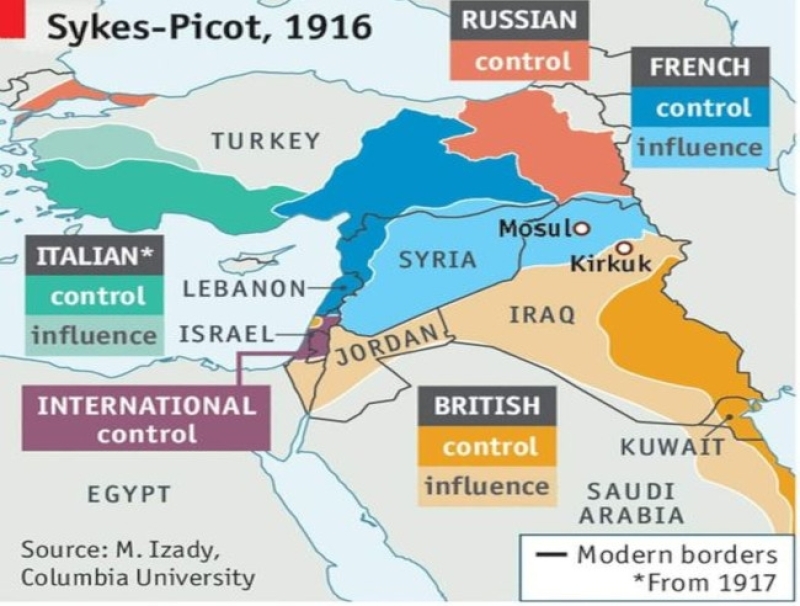Sykes-Picot (1916) The Parting of the Middle East
The modern borders of the Arab world vaguely resemble the blue and red crayon lines secretly drawn on a map of the Levant in May 1916, at the height of the First World War.
In late 1915, Sir Mark Sykes and François Georges-Picot were appointed by the British and French governments, respectively, to decide how the lands of the Ottoman Empire, which had entered the war on the side of Germany and the Central Powers, would be divided up. once he was defeated. Russian Foreign Minister Sergei Sazonov was also involved. The war was not going well at the time for the Entente. The British had failed in their attempt to approach the Ottoman capital after the Gallipoli disaster in January 1916, and their forces had surrendered at the siege of Kut in Mesopotamia in April.
Still, the Allies agreed that Russia would get Istanbul, and its long-awaited access to "warm waters" from the Black Sea to the Mediterranean to Armenia; the British would get Basra and southern Mesopotamia; and the French a piece in the middle, including Lebanon, Syria, and Cilicia (in present-day Turkey). Palestine would be an international territory. Between the blocs ruled by France and Britain, large tracts of territory, mostly desert, would be assigned to the respective spheres of influence of the two powers. The Italian claims were added in April 1917 as a way of making Rome happy to join the Entente.
But after the defeat of the Ottomans in 1918, the whole picture changed remarkably with the fortunes of war and diplomacy. The Russian Empire had ceased to exist, and with it the offers given earlier. The Italians, who were to receive southwestern Anatolia, received nothing. In 1920, the Turks, under Kemal Pasha Ataturk, expelled foreign troops from Anatolia and secured new favorable agreements with the victorious powers (1923 Treaty of Lausanne).
Still, Sykes-Picot became a byword for treason. George Antonius, an Arab historian, called it a shocking document, the product of "European greed." In fact, there were three separate and irreconcilable war commitments that Britain made at the same time with France, the Arabs, and the Jews. The resulting contradictions have sparked countless conflicts since then and many see the agreement as a turning point in relations between the Western world and the Arab world.
In the end, the promises made to the Arabs in return for allying with the British against the Turks were denied. These had hoped to create a great Hashemite kingdom ruled from Damascus, but only obtained several divided states. The Maronite Christians obtained part of Lebanon, but could not control it. The Kurds, who wanted an independent state for themselves, did not get one and were further divided among four countries. The Jews got a small slice of Palestine under "international administration." The city of Mosul was initially assigned to France, then claimed by Turkey and subsequently given to Britain, which joined it to the future kingdom of Iraq.
One reason for the dispute was the presence of oil. Even before the Great War, several Arab territories - Egypt, North Africa and sections of the Arabian Gulf - had already been divided into colonies or protectorates.
The Hashemite Arabs, who had led the Arab revolt against the Ottomans with the help of the British (especially T. E. Lawrence), were driven out of Syria by the French. They also lost their ancestral fiefdom of the Hejaz, with its holy cities of Mecca and Medina, to Abdel Aziz bin Saud, a British-backed Nejd chief. Together with his Wahhabi religious fanatics, he founded Saudi Arabia. A branch of the Hashemites ruled Iraq, but under strict British control; another branch still survives in the old region of Transjordan (a place name coined by Europeans), now called Jordan, which the British quickly separated from Palestine. All of these territorial awards were in line with the guidelines of the Sykes-Picot agreements.
After the Russian Revolution, Soviet claims to territories in the Ottoman Empire were denied, and so the Bolsheviks published the details of the Sykes-Picot agreement, (as well as other treaties) with the full texts in their journals Izvestia and Pravda on 23 November 1917; on the 26th of the same month The Manchester Guardian echoed this fact. This disclosure caused great commotion and embarrassment among the allies and fueled a great deal of mistrust between them and the Arab nationalists. The latter discovered that they had been used, cementing resentment throughout the region.
"Many countries have strange borders," says Rami Khouri of the Palestinian Academic Society for the Study of International Affairs. “However, for Arabs, Sykes-Picot is the symbol of a much deeper grievance. It's about a whole century in which the Western powers have played with us."
The consequences of its implementation created the conditions of French and British rule, which lasted until after the Second World War, and the regional conflicts that have prevented a lasting peace from those dates to the present.

Comments to this:



